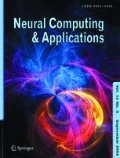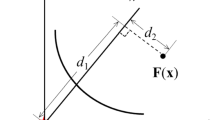Abstract
Decomposition strategy which employs predefined subproblem framework and reference vectors has significant contribution in multi-objective optimization, and it can enhance local convergence as well as global diversity. However, the fixed exploring directions sacrifice flexibility and adaptability; therefore, extra reference adaptations should be considered under different shapes of the Pareto front. In this paper, a population-based heuristic orientation generating approach is presented to build a dynamic decomposition. The novel approach replaces the exhaustive reference distribution with reduced and partial orientations clustered within potential areas and provides flexible and scalable instructions for better exploration. Numerical experiment results demonstrate that the proposed method is compatible with both regular Pareto fronts and irregular cases and maintains outperformance or competitive performance compared to some state-of-the-art multi-objective approaches and adaptive-based algorithms. Moreover, the novel strategy presents more independence on subproblem aggregations and provides an autonomous evolving branch in decomposition-based researches.







Similar content being viewed by others
References
Adra SF, Fleming PJ (2011) Diversity management in evolutionary many-objective optimization. IEEE Trans Evol Comput 15(2):183–195
Asafuddoula M, Ray T, Sarker R (2015) A decomposition-based evolutionary algorithm for many objective optimization. IEEE Trans Evol Comput 19(3):445–460. https://doi.org/10.1109/tevc.2014.2339823
Cai X, Li Y, Fan Z, Zhang Q (2015) An external archive guided multiobjective evolutionary algorithm based on decomposition for combinatorial optimization. IEEE Trans Evol Comput 19(4):508–523. https://doi.org/10.1109/tevc.2014.2350995
Cai X, Yang Z, Fan Z, Zhang Q (2016) Decomposition-based-sorting and angle-based-selection for evolutionary multiobjective and many-objective optimization. IEEE Trans Cybern PP(99):1–14
Cheng R, Jin Y, Olhofer M, Sendhoff B (2016) A reference vector guided evolutionary algorithm for many-objective optimization. IEEE Trans Evol Comput 20(5):773–791
Das I, Dennis JE (1998) Normal-boundary intersection: a new method for generating the pareto surface in nonlinear multicriteria optimization problems. SIAM J Optim 8(3):631–657. https://doi.org/10.1137/s1052623496307510
Deb K, Jain H (2014) An evolutionary many-objective optimization algorithm using reference-point-based nondominated sorting approach, part I: solving problems with box constraints. IEEE Trans Evol Comput 18(4):577–601. https://doi.org/10.1109/tevc.2013.2281535
Deb K, Pratap A, Agarwal S, Meyarivan T (2002) A fast and elitist multiobjective genetic algorithm: Nsga-ii. IEEE Trans Evol Comput 6(2):182–197. https://doi.org/10.1109/4235.996017 Pii S 1089-778x(02)04101-2
Deb K, Thiele L, Laumanns M, Zitzler E (2002) Scalable multi-objective optimization test problems. In: Cec’02: proceedings of the 2002 congress on evolutionary computation, vol 1–2, pp 825–830
Ding J, Liu J, Chowdhury KR, Zhang W, Hu Q, Lei J (2014) A particle swarm optimization using local stochastic search and enhancing diversity for continuous optimization. Neurocomputing 137:261–267
Figueiredo EMN, Ludermir TB, Bastos-Filho CJA (2016) Many objective particle swarm optimization. Inf Sci 374:115–134. https://doi.org/10.1016/j.ins.2016.09.026
Gee SB, Tan KC, Shim VA, Pal NR (2015) Online diversity assessment in evolutionary multiobjective optimization: a geometrical perspective. IEEE Trans Evol Comput 19(4):542–559. https://doi.org/10.1109/tevc.2014.2353672
Giagkiozis I, Purshouse RC, Fleming PJ (2014) Generalized decomposition and cross entropy methods for many-objective optimization. Inf Sci 282:363–387
He Z, Yen GG (2016) Many-objective evolutionary algorithm: objective space reduction and diversity improvement. IEEE Trans Evol Comput 20(1):145–160. https://doi.org/10.1109/tevc.2015.2433266
Huband S, Hingston P, Barone L, While L (2006) A review of multiobjective test problems and a scalable test problem toolkit. IEEE Trans Evol Comput 10(5):477–506
Ishibuchi H, Sakane Y, Tsukamoto N, Nojima Y (2010) Simultaneous use of different scalarizing functions in MOEA/D. In: Proceedings of the 12th annual conference on genetic and evolutionary computation, ACM, pp 519–526
Jain H, Deb K (2014) An evolutionary many-objective optimization algorithm using reference-point based nondominated sorting approach, part II: handling constraints and extending to an adaptive approach. IEEE Trans Evol Comput 18(4):602–622
Jiang Q, Wang L, Hei X, Yu G, Lin Y, Lu X (2016) Moea/d-ara+ sbx: a new multi-objective evolutionary algorithm based on decomposition with artificial raindrop algorithm and simulated binary crossover. Knowl Based Syst 107:197–218
Jost L (2006) Entropy and diversity. Oikos 113(2):363–375
Li K, Deb K, Zhang Q, Kwong S (2015) An evolutionary many-objective optimization algorithm based on dominance and decomposition. IEEE Trans Evol Comput 19(5):694–716. https://doi.org/10.1109/tevc.2014.2373386
Li K, Kwong S, Zhang Q, Deb K (2015) Interrelationship-based selection for decomposition multiobjective optimization. IEEE Trans Cybern 45(10):2076–2088
Liu B, Fernandez FV, Zhang Q, Pak M, Sipahi S, Gielen G (2010) An enhanced MOEA/D-DE and its application to multiobjective analog cell sizing. In: 2010 IEEE congress on evolutionary computation (CEC), IEEE, pp 1–7
Mei Y, Tang K, Yao X (2011) Decomposition-based memetic algorithm for multiobjective capacitated arc routing problem. IEEE Trans Evol Comput 15(2):151–165. https://doi.org/10.1109/tevc.2010.2051446
Ming M, Wang R, Zha Y, Zhang T (2017) Pareto adaptive penalty-based boundary intersection method for multi-objective optimization. Inf Sci 414:158–174. https://doi.org/10.1016/j.ins.2017.05.012
Pan A, Wang L, Guo W, Wu Q (2018) A diversity enhanced multiobjective particle swarm optimization. Inf Sci 436–437:441–465
Pilat M, Neruda R (2015) Incorporating user preferences in moead through the coevolution of weights. In: Proceedings of the 2015 annual conference on genetic and evolutionary computation, ACM, pp 727–734
Qi Y, Ma X, Liu F, Jiao L, Sun J, Wu J (2014) Moea/d with adaptive weight adjustment. Evol Comput 22(2):231–264
Reyes-Sierra M, Coello Coello CA (2006) Multi-objective particle swarm optimizers: a survey of the state-of-the-art. Int J Comput Intell Res 2(3):287–308
Rubio-Largo A, Zhang Q, Vega-Rodriguez MA (2014) A multiobjective evolutionary algorithm based on decomposition with normal boundary intersection for traffic grooming in optical networks. Inf Sci 289:91–116. https://doi.org/10.1016/j.ins.2014.08.004
Sato H (2014) Inverted PBI in MOEA/D and its impact on the search performance on multi and many-objective optimization. In: Proceedings of the 2014 annual conference on genetic and evolutionary computation, ACM, pp 645–652
Tian Y, Cheng R, Zhang X, Cheng F, Jin Y (2017) An indicator based multi-objective evolutionary algorithm with reference point adaptation for better versatility. IEEE Trans Evol Comput 22:609–622
Tian Y, Cheng R, Zhang X, Jin Y (2017) Platemo: a matlab platform for evolutionary multi-objective optimization. Neural Evol Comput 12(4):73–87
Trivedi A, Srinivasan D, Sanyal K, Ghosh A (2017) A survey of multiobjective evolutionary algorithms based on decomposition. IEEE Trans Evol Comput 21(3):440–462. https://doi.org/10.1109/tevc.2016.2608507
Wang H, Jin Y, Yao X (2016) Diversity assessment in many-objective optimization. IEEE Trans Cybern PP(99):1–13
Wang L, Zhang Q, Zhou A, Gong M, Jiao L (2016) Constrained subproblems in a decomposition-based multiobjective evolutionary algorithm. IEEE Trans Evol Comput 20(3):475–480. https://doi.org/10.1109/tevc.2015.2457616
Wang R, Xiong J, Ishibuchi H, Wu G, Zhang T (2017) On the effect of reference point in MOEA/D for multi-objective optimization. Appl Soft Comput 58(Supplement C):25–34. https://doi.org/10.1016/j.asoc.2017.04.002
Wang Z, Zhang Q, Li H (2015) Balancing convergence and diversity by using two different reproduction operators in MOEA/D: some preliminary work. In: 2015 IEEE international conference on systems, man, and cybernetics (SMC), IEEE, pp 2849–2854
Wu M, Li K, Kwong S, Zhou Y (2017) Adaptive two-level matching-based selection for decomposition multi-objective optimization. IEEE Trans Evol Comput PP(99):1–1. https://doi.org/10.1109/TEVC.2017.2656922
Yang S, Jiang S, Jiang Y (2017) Improving the multiobjective evolutionary algorithm based on decomposition with new penalty schemes. Soft Comput 21(16):4677–4691
Yu G, Zheng J, Shen R, Li M (2016) Decomposing the user-preference in multiobjective optimization. Soft Comput 20(10):4005–4021. https://doi.org/10.1007/s00500-015-1736-z
Yuan Y, Xu H, Wang B, Zhang B, Yao X (2016) Balancing convergence and diversity in decomposition-based many-objective optimizers. IEEE Trans Evol Comput 20(2):180–198. https://doi.org/10.1109/tevc.2015.2443001
Zhang H, Llorca J, Davis CC, Milner SD (2012) Nature-inspired self-organization, control, and optimization in heterogeneous wireless networks. IEEE Trans Mob Comput 11(7):1207–1222
Zhang H, Song S, Zhou A, Gao XZ (2014) A clustering based multiobjective evolutionary algorithm. In: 2014 IEEE congress on evolutionary computation, pp 723–730
Zhang Q, Li H (2007) MOEA/D: a multiobjective evolutionary algorithm based on decomposition. IEEE Trans Evol Comput 11(6):712–731. https://doi.org/10.1109/tevc.2007.892759
Zhang Q, Zhou A, Zhao S, Suganthan PN, Liu W, Tiwari S (2008) Multiobjective optimization test instances for the CEC 2009 special session and competition. University of Essex, Colchester, UK and Nanyang technological University, Singapore, special session on performance assessment of multi-objective optimization algorithms, technical report, pp 1–30
Zhou A, Zhang Q (2016) Are all the subproblems equally important? Resource allocation in decomposition-based multiobjective evolutionary algorithms. IEEE Trans Evol Comput 20(1):52–64. https://doi.org/10.1109/tevc.2015.2424251
Acknowledgements
This work is supported by the China Scholarship Council, 201706260064, National Natural Science Foundation of China under Grant Nos. 61503287 & 71771176, NUSRI China Jiangsu Provincial Grant BK20150386 & BE2016077, and Zhejiang Provincial Natural Science Foundation of China under Grant No. LY18F030010. The authors would like to thank Abigail Martin for the proofreading.
Author information
Authors and Affiliations
Corresponding author
Ethics declarations
Conflict of interest
The authors declare that they have no conflict of interest.
Rights and permissions
About this article
Cite this article
Pan, A., Wang, L., Guo, W. et al. Heuristic orientation adjustment for better exploration in multi-objective optimization. Neural Comput & Applic 32, 4757–4771 (2020). https://doi.org/10.1007/s00521-018-3848-8
Received:
Accepted:
Published:
Issue Date:
DOI: https://doi.org/10.1007/s00521-018-3848-8




